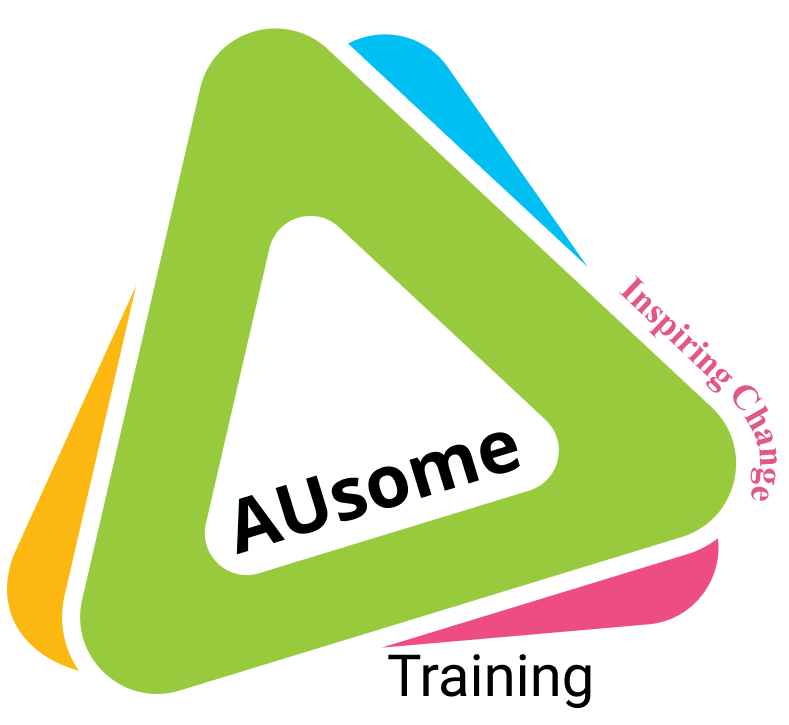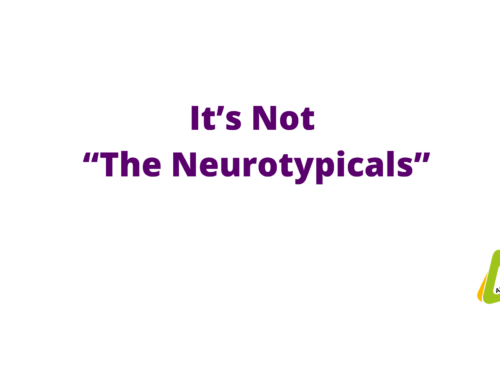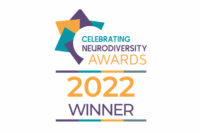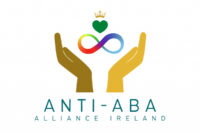Theory of Mind

This was originally written for a fundraising event my friend and colleague Maqqi organised to support www.prodeste.pl who are supporting Autistics from Ukraine:
“Experts” say that we have difficulties in communication and yet here we are the Neurodivergent Community— a global network of Neurodivergent people , communicating, connecting, supporting and advocating for ourselves and others.
We come from a community that carries many burdens, many theories, rumours if you will, that were put out about us decades ago by professionals who decided that we were not as worthy of our rights as others. We have been pathologised and marginalised all in the name of “science”.
They said we lacked empathy.
Of course we do not, and our collective levels of empathy can be witnessed on days like today where one community holds this event in order to support another community which is yet supporting another community.
But decades has gone into flawed research and therapies to teach us how to develop empathy- when we do not need to do so.
The discussion around empathy is an interesting one.
- What is it?
- How do we display it?
- Do we live in a world that severely lacks empathy.
On a basic level empathy is how we see each other. It’s how we meet each other at a heart level and how we understand someone’s perspective when it is not our own.
Each of us as humans develop a view of the world depending on how we experience the world and on how that world treats us.
When we grow up in an oppressed minority, in a world that does not want nor understand us then we have a different view of the world to someone who grows up feeling accepted.
Humans seem to have a general difficulty meeting each other at a heart level although I doubt this is something innate within our fibres and more to do with the societies in which we live.
Our societies, by and large have been built upon oppression, segregation and the rules of the powerful which have forced us further and further away from each other.
The world which we inhabit today is built on the bones of corruption, the blood of the oppressed and the ideas that some of us are more worthy of our rights than others.
Our cities and towns stand on lands which once belonged to no one, that once belonged to us all. We fence off our properties and fence off our hearts from each other. Those of us with privilege mind and watch our inherited status, knowing that it’s a fragile thing that can be taken away from us just like it was taken away from those who went before us.
Our world is built on a pile of pain, a pile of greed and on a pile of meaningless declarations by invaders that some were more worthy than others.
And so we could say that our world lacks empathy and that we all have difficulties understanding and meeting each other at a heart level but there are moments in each day and times in our lives where we can set our differences aside and help each other. It is in these moments when we answer each others cries, that we witness and channel our true humanity and not the behaviours and ideas imposed on us by those who prosper from our collective oppression.
Theory of mind is defined as the ability to attribute mental states to others and interpret their actions – it’s probably something many of us have difficulty when it comes to understanding those in power right now. If humans indeed have the ability to attribute mental states to others and interpret their actions then why is our world such a mess? Why are we living in chaos?
And why do professionals have such a hard time understanding the mental states of Autistics and interpreting our actions? Perhaps because they never bothered to ask us- because we were a community cast aside, pathologised, experimented on and abused for our very human differences.
In the early 90’s Simon Baron Cohen, with very flimsy “evidence” if we can even call it that declared Autistics lack theory of mind, that we don’t understand other people.
Thankfully Damian Milton, an Autistic psychologist coined the term “double empathy” in 2012 putting forward a much more well thought out and realistic theory that says yes, perhaps Autistic people do have difficulty understanding people who are not Autistic but it’s a double problem, not one that goes one way because non-autistic people seem to have grave difficulty understanding us- which is illustrated by the utter tosh and nonsense theories that they’ve written about us.
And so Damian’s theory can be extended to all of humanity really – we are not very good at seeing things from perspectives outside of our own. Each marginalised community faces the same struggles- advocating for rights, fighting to be seen as equal, to be accepted as worthy rather than mistreated by those who do not experience the world as they do.
This topic of empathy, or double empathy is not just relevant when we talk about Autistics, it is relevant when we consider how we interact with each other, respect each other and accept that we are all different but on a fundamental human level we are all the same. At a heart level we are all the same, living in this world striving to belong, to connect and to feel accepted.
Somewhere on our journey through the millennia we seem to have forgotten this. We’ve forgotten that we are all the same really and our differences are only magnified because that is what our world is built on- magnifying differences to convince us that some of us are more human than others.
As well as deciding that Autistics are lacking in theory of mind- the “experts” also decided that we lack social skills. Because Autistics question, because we show interest in aspects of our world and other people that others do not even notice, because we are sensitive, because we experience the world intensely and interact with others in the same way we interact with our world- full throttle, full on, ready to connect at a heart level with little time for fanciful and meaningless exchanges – we somehow are the ones who have difficulty socially.
The fact that Autistics, who are direct and straight in our communication and who feel the pain of others as deeply as our own, who see others as equals rather than pawns in a power game that is not of our design- we, somehow we are the ones that lack social skills?
Autistic people communicate in a highly effective way with other Autistic people. Our difficulties present when people who do not communicate in a straight forward way judge us, misinterpret us and other us. We are not responsible for how others come to meet us. We are not responsible for our own oppression.
We could argue that Autistic people have a communication style specific to us and that is what current research shows. But I would rather argue that the way we communicate is how humans innately communicate when we aren’t swept up in the power games and status and using our words to show our power rather than to connect and share. I would argue that because of our relationship with this world, we experience it in all its glory, in all its truth and we share this relationship when we communicate with others, through our words, through our actions and through our stims.
The world is the emperor and we are the child telling it – it is wearing no clothes. That because of our relationship with this world, because of our sensitivity we are less likely to be conditioned into playing games which serve no purpose for the many and only benefit the few.
It would seem, from my Autistic viewpoint that non-neurodivergent communication is a series of learnt, well rehearsed and well rewarded bows and gestures. A series of signals and signs, calls and echoes, all performed and repeated like a dance whose rules and regulations have been lain down by generations. Lain down in millennia of oppression and forced disconnection from how we actually communicate and empathise with each other as human beings. It would seem that the difference between Neurodivergents and majorities is their ability to be conditioned into thinking this is the way we actually should behave towards one another.
Hierarchical social structures are based on the illusion that one person is more powerful than the other. And that power often comes from symbols. Other times it comes from having more knowledge, or more skills or creating the illusion of importance. What has happened to experiencing real emotions, real connection, real affection, real meaningful relationships in our current culture?
We live in a world where some young people are now connecting more to brands than with their own families. We live in a world where people feel a distance from others they do not know while forgetting that we are all connected, we are all related, we are all one family and we are all one.
Autistics and others diverge from this idea of what is appropriate or acceptable. We do not comply. We do not take part in the beautiful but meaningless-beneath-the-surface dance and so we are ostracised, pathologized and abused. We are cast out because we refuse to play by illogical and harmful rules. Neuro-majorities are the proud emperor and we are the child telling them they’re wearing no clothes.
They are wearing no clothes as they continue to dance. The dance which was carefully cultivated through generations of systems, coercion, hardship, struggles, revolutions, wars and social classes. It is there to stop opportunities for true connection. To stop us being who we are meant to be. It keeps us divided and keeps us believing that we need to be wary of each other when in fact it is the masters of the dance who we need to direct our attentions towards.
The carefully cultivated dance – a symbolic ritual where one bows to another, registering the relinquishing of power, winching in defeat. The other struts, registering the win. And so the dance is played out amongst us, each day, as we talk about the weather and see who wins this round of power games. Passed on from one generation to the next as “etiquette”, as “manners”, as “social skills”, as whatever nice word we can find to hide what it truly is: A ritual for our generalised oppression. The truth is -no one ever wins.
You can still donate to their ongoing work
Watch Evaleen deliver this speech
https://www.youtube.com/watch?v=Ozobf1529HU
Book a Speaker




